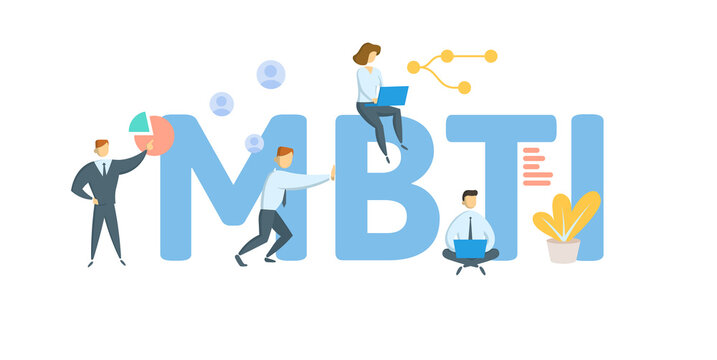The Myers-Briggs Type Indicator (MBTI) is a widely used personality assessment tool that is designed to measure the psychological preferences of individuals. The MBTI is based on the work of Carl Jung, who believed that human behavior is not random but rather reflects certain patterns of thinking, feeling, and perceiving. The MBTI is used in a variety of settings, including career counseling, team building, and personal development.
The MBTI assessment is based on a series of questions that are designed to measure an individual’s preferences in four key areas:
- Extraversion (E) or Introversion (I)
- Sensing (S) or Intuition (N)
- Thinking (T) or Feeling (F)
- Judging (J) or Perceiving (P)
The combination of these preferences results in 16 different personality types, each with its own set of characteristics and strengths.
The MBTI personality types
Each of the 16 personalities identified by the MBTI has its own unique set of traits, tendencies, and behaviors. While individuals may identify with certain aspects of multiple personality types, the MBTI aims to provide a clearer understanding of an individual’s dominant personality type. By understanding their own personality type, individuals can gain insights into their strengths and weaknesses, their communication style, and their preferred ways of learning and problem-solving. This can be particularly helpful in relationships, personal development, and career planning, as it can help individuals identify their strengths and align their choices with their natural tendencies and preferences.

ISTJ – The Inspector
ISTJs are practical, dependable, and responsible. They value tradition and order, and they are often seen as reliable and hardworking. They are good at planning and are very detail-oriented, which makes them excellent in jobs that require accuracy and precision. However, ISTJs can sometimes be too rigid and inflexible, and they may struggle to adapt to change.
ISFJ – The Protector
ISFJs are warm, compassionate, and dependable. They have a strong sense of duty and are committed to helping others. They are excellent at anticipating the needs of others and are often seen as thoughtful and caring. ISFJs are also detail-oriented and have a good memory, which makes them well-suited for jobs that require organization and attention to detail. However, ISFJs can be too self-sacrificing and may neglect their own needs in order to help others.
INFJ – The Counselor
INFJs are insightful, empathetic, and creative. They have a strong sense of intuition and are often able to see the potential in people that others miss. They are good at reading people and are able to connect with others on a deep level. INFJs are also idealistic and have a strong sense of purpose, which makes them well-suited for jobs that involve helping others. However, INFJs can be too idealistic and may struggle to accept the realities of the world.
INTJ – The Mastermind
INTJs are analytical, strategic, and independent. They have a strong sense of logic and are excellent problem-solvers. They are good at seeing the big picture and are often able to anticipate problems before they occur. INTJs are also independent and have a strong sense of purpose, which makes them well-suited for jobs that require innovation and leadership. However, INTJs can be too critical and may struggle to connect with others on an emotional level.
ISTP – The Craftsman
ISTPs are practical, logical, and independent. They have a strong sense of curiosity and enjoy solving problems. They are good at fixing things and are often seen as mechanically inclined. ISTPs are also adaptable and enjoy exploring new ideas, which makes them well-suited for jobs that involve creativity and problem-solving. However, ISTPs can be too impulsive and may struggle to consider the long-term consequences of their actions.
ISFP – The Composer
ISFPs are artistic, sensitive, and compassionate. They have a strong sense of aesthetics and enjoy creating things. They are good at appreciating beauty and are often drawn to careers that involve art or music. ISFPs are also empathetic and are able to connect with others on an emotional level, which makes them well-suited for jobs that involve counseling or social work. However, ISFPs can be too sensitive and may struggle to handle criticism.
INFP – The Mediator
INFPs are empathetic, creative, and idealistic. They have a strong sense of values and are committed to helping others. They are good at understanding people and are often able to offer insightful advice. INFPs are also imaginative and enjoy exploring new ideas, which makes them well-suited for jobs that involve creativity and innovation. However, INFPs can be too idealistic and may struggle to deal with the realities of the world.
INTP – The Architect
INTPs are logical, analytical, and independent. They have a strong sense of curiosity and enjoy exploring new ideas. They are good at solving complex problems and are often seen as highly intelligent. INTPs are also independent and enjoy pursuing their interests, which makes them well-suited for careers that involve research or innovation. However, INTPs can be too critical and may struggle to connect with others on an emotional level.
ESTP – The Dynamo
ESTPs are energetic, adventurous, and action-oriented. They have a strong sense of spontaneity and enjoy taking risks. They are good at thinking on their feet and are often seen as highly adaptable. ESTPs are also outgoing and enjoy being around others, which makes them well-suited for careers that involve sales or entertainment. However, ESTPs can be too impulsive and may struggle to consider the long-term consequences of their actions.
ESFP – The Performer
ESFPs are outgoing, energetic, and sociable. They have a strong sense of fun and enjoy being around others. They are good at entertaining people and are often seen as charismatic. ESFPs are also good at sensing the needs of others and are well-suited for careers that involve customer service or hospitality. However, ESFPs can be too impulsive and may struggle to handle criticism.
ENFP – The Champion
ENFPs are outgoing, creative, and enthusiastic. They have a strong sense of idealism and are committed to helping others. They are good at understanding people and are often able to offer insightful advice. ENFPs are also imaginative and enjoy exploring new ideas, which makes them well-suited for careers that involve creativity and innovation. However, ENFPs can be too idealistic and may struggle to handle criticism.
ENTP – The Visionary
ENTPs are analytical, independent, and creative. They have a strong sense of curiosity and enjoy exploring new ideas. They are good at solving complex problems and are often seen as highly intelligent. ENTPs are also independent and enjoy pursuing their interests, which makes them well-suited for careers that involve research or innovation. However, ENTPs can be too critical and may struggle to connect with others on an emotional level.
ESTJ – The Supervisor
ESTJs are practical, dependable, and organized. They value tradition and order, and they are often seen as reliable and hardworking. They are good at planning and are very detail-oriented, which makes them excellent in jobs that require accuracy and precision. ESTJs are also outgoing and enjoy being around others, which makes them well-suited for careers that involve leadership or management. However, ESTJs can be too rigid and may struggle to adapt to change.
ESFJ – The Provider
ESFJs are warm, caring, and dependable. They have a strong sense of duty and are committed to helping others. They are excellent at anticipating the needs of others and are often seen as thoughtful and compassionate. ESFJs are also detail-oriented and have a good memory, which makes them well-suited for jobs such as nursing, teaching, or social work. However, ESFJs can be too focused on pleasing others and may struggle to assert themselves in certain situations.
ENFJ – The Teacher
ENFJs are outgoing, empathetic, and intuitive. They have a strong sense of purpose and are committed to helping others. They are good at understanding people and are often able to offer insightful advice. ENFJs are also organized and enjoy creating order, which makes them well-suited for jobs that involve leadership or management. However, ENFJs can be too focused on harmony and may struggle to make tough decisions.
ENTJ – The Commander
ENTJs are confident, logical, and strategic. They have a strong sense of vision and are committed to achieving their goals. They are good at problem-solving and are often seen as natural leaders. ENTJs are also decisive and enjoy taking charge, which makes them well-suited for careers in business or politics. However, ENTJs can be too focused on efficiency and may struggle to consider the emotions of others.
The Myers-Briggs Type Indicator (MBTI) is a useful tool for understanding different personality types. Each of the 16 personality types has its strengths and weaknesses, and understanding these can help individuals better understand themselves and others. However, it is important to remember that the MBTI is not a definitive assessment of personality and should not be used as the sole basis for making important decisions. Instead, it should be used as a tool for self-discovery and personal growth.
This piece is a preserved fossil from our earlier ecosystem—beautiful, but part of a simpler food chain. The evolution has been… spectacularly messy. If the core of this resonated with you, your soul might be ready for the full, neurodivergent taxonomy. The journey continues. If you’d like to fuel the next phase of exploration, you can support it here.
Also read: Introverts and Emotional Intelligence: The Basics











No Comment! Be the first one.